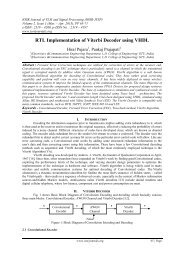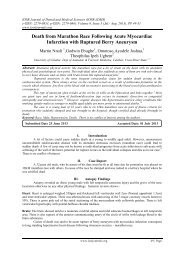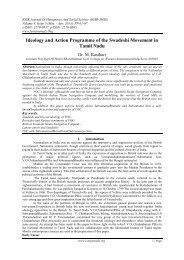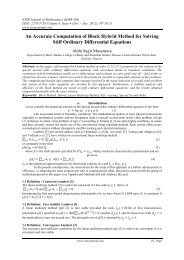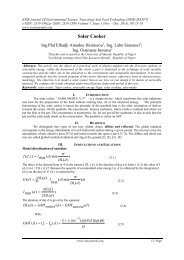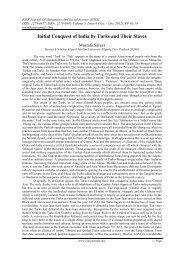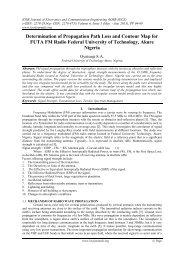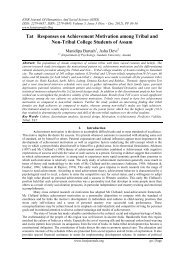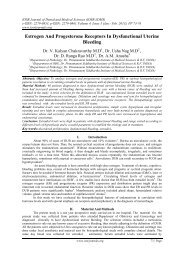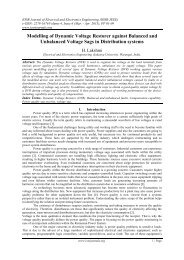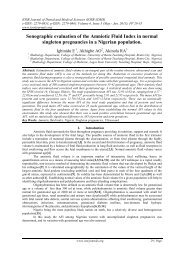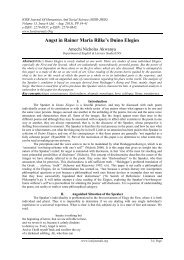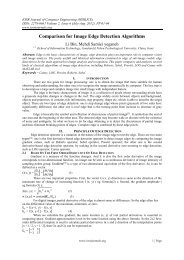Design Compatibility of Classroom Furniture in Urban and ... - IOSR
Design Compatibility of Classroom Furniture in Urban and ... - IOSR
Design Compatibility of Classroom Furniture in Urban and ... - IOSR
You also want an ePaper? Increase the reach of your titles
YUMPU automatically turns print PDFs into web optimized ePapers that Google loves.
„Verbal Carpentry‟ As Language Of Political Corruption In Nigeria<br />
be used. For example, R. Arc<strong>and</strong> <strong>and</strong> N. Bourbeau use an <strong>in</strong>tention-based criterion. The dom<strong>in</strong>ant function is the<br />
one that answers the question, 'With what <strong>in</strong>tention was this message transmitted?' …<strong>and</strong> the secondary<br />
functions are there to support it. We must dist<strong>in</strong>guish the <strong>in</strong>tention associated with each fragment from the<br />
overall <strong>in</strong>tention, which is a sentence or series <strong>of</strong> sentences that corresponds to an <strong>in</strong>tention (Arc<strong>and</strong>, R. <strong>and</strong><br />
Bourbeau, N. 1995). S<strong>in</strong>ce the <strong>in</strong>tention can be hidden, the function that is dom<strong>in</strong>ant <strong>in</strong> terms <strong>of</strong> overt degree <strong>of</strong><br />
presence may not be dom<strong>in</strong>ant <strong>in</strong> terms <strong>of</strong> <strong>in</strong>tention. Arc<strong>and</strong> <strong>and</strong> Bourbeau also dist<strong>in</strong>guish between direct <strong>and</strong><br />
<strong>in</strong>direct manifestations <strong>of</strong> <strong>in</strong>tention, which correlate to the opposition between actual <strong>and</strong> overt functions. The<br />
appellative (conative) function is manifested directly <strong>in</strong> "Go answer the door" <strong>and</strong> <strong>in</strong>directly <strong>in</strong> "The doorbell<br />
rang" (which is equivalent to "Go answer the door"), where the overt function is the referential (or <strong>in</strong>formative)<br />
function.<br />
In this paper, we shall adopt Arc<strong>and</strong> <strong>and</strong> Bourbeau‘s <strong>in</strong>tention-based criterion <strong>in</strong> establish<strong>in</strong>g the<br />
functional hierarchy <strong>of</strong> the verbal communication act be<strong>in</strong>g performed by Nigerian political leaders <strong>in</strong> the<br />
rout<strong>in</strong>e course <strong>of</strong> walk<strong>in</strong>g the tightrope <strong>of</strong> governance. In essence, it seems pert<strong>in</strong>ent to determ<strong>in</strong>e the extent to<br />
which the overt degree <strong>of</strong> presence <strong>of</strong> <strong>in</strong>tention is dom<strong>in</strong>ant <strong>in</strong> terms <strong>of</strong> message be<strong>in</strong>g transmitted. This harks<br />
back to J. L. Aust<strong>in</strong>‘s felicity condition <strong>of</strong> s<strong>in</strong>cerity (Aust<strong>in</strong>, J. L. 1962) <strong>and</strong> Paul Grice‘s maxim <strong>of</strong> quality,<br />
which evaluate the truth conditions <strong>of</strong> message(s) <strong>in</strong>tended <strong>in</strong> a given set <strong>of</strong> speech acts (Grice, P. 1975). In this<br />
regard, our primary aim is to exam<strong>in</strong>e the communication system <strong>of</strong> Nigerian politicians from the <strong>in</strong>tentionbased<br />
perspective <strong>of</strong> Arc<strong>and</strong> <strong>and</strong> Bourbeau (1995) <strong>and</strong> determ<strong>in</strong>e the extent to which it impacts on the quality <strong>of</strong><br />
governance deriv<strong>in</strong>g from a constitutional democratic experiment.<br />
III. Verbal Carpentry As Language Of Political Corruption<br />
Corruption is an all-pervad<strong>in</strong>g phenomenon <strong>in</strong> Nigeria. If the ‗Nigerian factor‘ is corruption, the<br />
primary mode <strong>of</strong> illegitimate corruption <strong>in</strong> Nigeria is 419, named after the number <strong>in</strong> the Nigerian penal code<br />
that deals with a specific form <strong>of</strong> fraud (Smith, D. J. 2006). Cit<strong>in</strong>g Apter (2005), Smith notes how 419 emerged<br />
as Nigerians became disillusioned with the state at the same time that the state itself, no longer awash <strong>in</strong> oil<br />
money, relied on the politics <strong>of</strong> illusion to ma<strong>in</strong>ta<strong>in</strong> its erod<strong>in</strong>g legitimacy. There is no ga<strong>in</strong>say<strong>in</strong>g the fact that<br />
the orig<strong>in</strong>al 419 scams have cont<strong>in</strong>ued to flourish <strong>and</strong> <strong>in</strong>novate with dizzy<strong>in</strong>g sophistications. If anyth<strong>in</strong>g, the<br />
scam bus<strong>in</strong>esses have <strong>in</strong>creased <strong>and</strong> diversified as the Internet has democratized unlimited access to the<br />
technology <strong>of</strong> 419. But even more significant than the cont<strong>in</strong>ued practice <strong>of</strong> 419 scams through e-mail is the fact<br />
that the traditional mean<strong>in</strong>g <strong>of</strong> the orig<strong>in</strong>al 419 scams has undergone rapid semantic extensions to become an<br />
all-encompass<strong>in</strong>g metaphor <strong>in</strong> Nigerian discourse for any behavior that relies on dissimulation, illusion, or some<br />
other manipulation <strong>of</strong> the truth <strong>in</strong> order to facilitate illicit ga<strong>in</strong> or undue advantage. In fact, virtually noth<strong>in</strong>g<br />
illustrates better the Nigerian encapsulation <strong>of</strong> political corruption than the wide spectrum <strong>of</strong> activities <strong>and</strong><br />
behaviour <strong>of</strong> political leaders that are described as 419. In this section, we subject this perverse act <strong>of</strong><br />
crim<strong>in</strong>ality to l<strong>in</strong>guistic lie detection device <strong>and</strong> determ<strong>in</strong>e the extent to which 419 – illusion simulation through<br />
<strong>in</strong>genious deployment <strong>of</strong> deceptive language- is the central strategy.<br />
Our l<strong>in</strong>guistic lie detection technique derives from Nejolla Korris‘ Scientific Content Analysis<br />
(SCAN). Korris‘ SCAN is a type <strong>of</strong> l<strong>in</strong>guistic lie detection device, which relies on a series <strong>of</strong> reliable tip-<strong>of</strong>fs to<br />
catch deceivers <strong>in</strong> the act (Elliot, R. 2007). One such trigger is the subject's emotions. Those tell<strong>in</strong>g the truth are<br />
quite emotive when tell<strong>in</strong>g their version <strong>of</strong> events, <strong>and</strong> they will use words like stolen, theft, <strong>and</strong> fraud dur<strong>in</strong>g<br />
their testimony. Conversely, liars are emotionally controlled, because they have rehearsed their answers ahead<br />
<strong>of</strong> time, <strong>and</strong> they are likely to use words such as miss<strong>in</strong>g, misplaced, <strong>and</strong> gone. "When it is play<strong>in</strong>g like it's a<br />
real-time story, it usually is a real-time story, <strong>and</strong> it is not com<strong>in</strong>g from anywhere <strong>in</strong> the memory," says Korris.<br />
Crim<strong>in</strong>als share one trait <strong>in</strong> common, regardless <strong>of</strong> their nationality. They th<strong>in</strong>k they can fool <strong>in</strong>terrogators with<br />
clever stories.<br />
In this paper, we exam<strong>in</strong>e the deceptive use <strong>of</strong> language by political <strong>of</strong>fice holders to perpetrate<br />
corruption <strong>and</strong> see whether the same trait <strong>of</strong> deception runs through them. Our analysis may prove us as a<br />
Nejolla Korris with whom crim<strong>in</strong>als are less likely to succeed <strong>in</strong> fobb<strong>in</strong>g <strong>of</strong>f with fables if they crossed his<br />
paths.<br />
1. Avoidance strategy<br />
Here, we <strong>in</strong>tend to show how political corruption <strong>in</strong> Nigeria is perpetrated through avoidance strategy,<br />
that is, the deliberate use <strong>of</strong> deceptive words to obfuscate corrupt practices. By us<strong>in</strong>g Arc<strong>and</strong> <strong>and</strong> Bourbeau‘s<br />
<strong>in</strong>tention-based criterion to establish the functional hierarchy <strong>of</strong> such words/phrases as misappropriation,<br />
misapplication, s<strong>of</strong>t lad<strong>in</strong>g, we would, perhaps be predisposed to determ<strong>in</strong><strong>in</strong>g the extent to which the overt<br />
degree <strong>of</strong> presence <strong>of</strong> <strong>in</strong>tention is dom<strong>in</strong>ant <strong>in</strong> terms <strong>of</strong> the message be<strong>in</strong>g transmitted. In essence, the <strong>in</strong>tentionbased<br />
criterion <strong>in</strong> concert with Aust<strong>in</strong>‘s (1962) felicity condition <strong>of</strong> s<strong>in</strong>cerity <strong>and</strong> Grice‘s maxim <strong>of</strong> quality<br />
provides the theoretical basis for evaluat<strong>in</strong>g the truth conditions <strong>of</strong> such words aforementioned. Our work<strong>in</strong>g<br />
www.iosrjournals.org<br />
29 | Page



